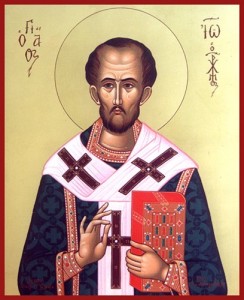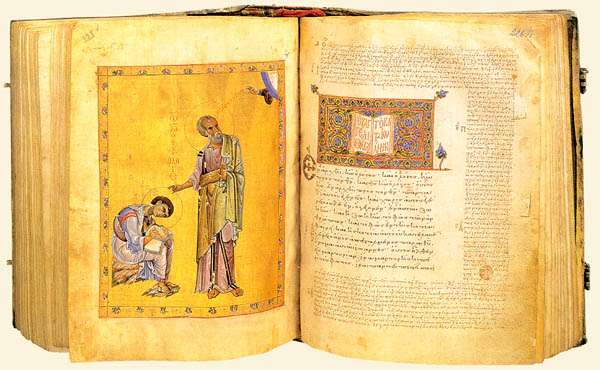Worship in the Orthodox Church
 The Divine Liturgy of St. John Chrysostom is today the primary worship service of over 300 million Orthodox Christians around the world, from Greece to Finland, from Russia to Tanzania, from Japan to Kenya, Bulgaria to Australia. It is celebrated in dozens of languages, from the original Greek it was written in to English and French, Slavonic and Swahili, Korean and Arabic.
The Divine Liturgy of St. John Chrysostom is today the primary worship service of over 300 million Orthodox Christians around the world, from Greece to Finland, from Russia to Tanzania, from Japan to Kenya, Bulgaria to Australia. It is celebrated in dozens of languages, from the original Greek it was written in to English and French, Slavonic and Swahili, Korean and Arabic.
What does the word Liturgy mean? Liturgy is a Greek word that in classical times referred to the performance of a public duty; in the Septuagint, the Greek translation of the Old Testament made some 300 years before the coming of Christ that was used by the authors of the New Testament, it referred to worship in the Temple in Jerusalem; and for Orthodox Christians it has come to mean the public worship of the Church. Because Liturgy is always a corporate, communal action, it is often translated as “the work of the people” and because it is prefaced by the word “Divine” it is specifically the work of God’s people and an experience of God’s coming Kingdom here and now by those who gather to worship Him as members of the “royal priesthood…a people belonging to God” (1 Peter 2:9).
The Divine Liturgy is also called the Eucharist, the ancient Greek word for “thanksgiving” or “gratitude.” The Christian Eucharist is a meal specifically connected with the Passover meal of the Old Testament commemorating the liberation of the ancient Israelites from slavery in Egypt as told in the Book of Exodus. At the Last Supper with His disciples, Christ transformed this ancient Passover ritual into an act done in remembrance of Him: His life, teaching, death and resurrection. He is the new and eternal Passover lamb whose sacrificial death and resurrection from the dead frees all of humanity from slavery to sin, evil and death and opens the path to forgiveness and liberation from sin, freedom from death, eternal life and the coming of the Kingdom of God. The Eucharist is an expression of gratitude to God for the gifts of His Son and Spirit, our redemption and freedom.
The text of the Liturgy of St. John Chrysostom, including commentary from our own Father Steven Tsichlis, can be found HERE.
Articles on Worship
Articles on Worship
-
Worship by Father Thomas Fitzgerald
-
The House of God by Father Thomas Fitzgerald
-
Who May Receive Holy Communion In the Orthodox Church? by Father Steven Tsichlis
-
The Sacraments by Father Thomas Fitzgerald
-
Eucharistic Discipline in the Orthodox Church by Father Thomas Hopko
-
Preparation for Holy Communion by Father Thomas Hopko
-
On the Question of Liturgical Practices: A Letter to My Bishop by Father Alexander Schmemann
-
Special Services and Blessings by Father Thomas Fitzgerald
Articles on Worship
Articles on Worship
-
The Sacramental Life of the Orthodox Church by Father Alciviadis Calivas
-
Orthodox Worship by Father Alciviadis Calivas
-
Worship, Beauty and the Desire for God by Frederica Mathewes-Green (from her book, At the Corner of East and Now)
-
A Hunger for God by Dr. Paraskevè (Eve) Tibbs
-
Orthodox Art and Architecture by Dr. John Yiannias
-
The Liturgical Path of Orthodoxy in America by Dr. Paul Meyendorff
-
The Archdiocesan Presbyters Council Liturgical Issues Committee Report by Father Steven Tsichlis
-
Resources for Great Lent in the Orthodox Church
The Biblical Teaching on Holy Communion
 The Lord Jesus said: “I am the bread of life. Whoever comes to me will never be hungry and whoever believes in me will never be thirsty. I am the living bread which came down from heaven. If anyone eats of this bread, they will live forever; and the bread which I shall give for the life of the world is my flesh. Amen, amen, I say to you: unless you eat the flesh of the Son of Man and drink his blood, you have no life in you. Those who eat my flesh and drink my blood have eternal life and I will raise them up on the last day. For my flesh is true food and my blood is true drink. Those who eat my flesh and drink my blood abide in me and I in them. Just as the living Father sent me and I live because of the Father, so whoever eats me will live because of me.” – John 6:35, 51, 53-57
The Lord Jesus said: “I am the bread of life. Whoever comes to me will never be hungry and whoever believes in me will never be thirsty. I am the living bread which came down from heaven. If anyone eats of this bread, they will live forever; and the bread which I shall give for the life of the world is my flesh. Amen, amen, I say to you: unless you eat the flesh of the Son of Man and drink his blood, you have no life in you. Those who eat my flesh and drink my blood have eternal life and I will raise them up on the last day. For my flesh is true food and my blood is true drink. Those who eat my flesh and drink my blood abide in me and I in them. Just as the living Father sent me and I live because of the Father, so whoever eats me will live because of me.” – John 6:35, 51, 53-57
The apostle Paul said: “The cup of blessing which we bless: is it not a participation in the blood of Christ? The bread which we break: is it not a participation in the body of Christ? Because there is one loaf, we who are many are one body, for we all partake of the same loaf.
For I received from the Lord what I also handed on to you: that the Lord Jesus, on the night when he was betrayed, took a loaf of bread and when he had given thanks, he broke it and said, This is my body which is broken for you. Do this in remembrance of me. In the same way, after supper, he also took the cup, saying, This cup is the New Testament in my blood. Do this, as often as you drink it, in remembrance of me. For as often as you eat this bread and drink the cup, you proclaim the Lords death until he comes.
Whoever, therefore, eats the bread of drinks the cup of the Lord in an unworthy manner will be answerable for the body and blood of the Lord. Examine yourselves and only then eat of the bread and drink of the cup. For all who eat and drink in an unworthy manner, without discerning the Lords body, eat and drink judgment against themselves. For this reason, many of you are weak and ill and some have died.”
– 1 Corinthians 10:16-17; 11:23-30
Also, read the accounts of the Last Supper given at Matthew 26:26-29; Mark 14:22-25 and Luke 22:14-23.



